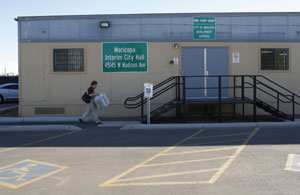 Maricopa, Ariz., was one of the fastest growing cities in the U.S. until vast unemployment and the real estate bust swept through the country. (Joshua Lott/Getty Images)
Maricopa, Ariz., was one of the fastest growing cities in the U.S. until vast unemployment and the real estate bust swept through the country. (Joshua Lott/Getty Images)
Arizona has one of the highest Medicaid rates in the country. About 1 out of every 5 residents is covered by the program for the poor and disabled. That doesn’t include illegal immigrants, who are barred from receiving state services. And the Medicaid rolls there are increasing rapidly in this economy, primarily due to slumps in the construction and service industries.
“In a normal year, we might see 60,000 additional members,” says Tony Rodgers, director of the Arizona Health Care Cost Containment System (AHCCCS), the state’s Medicaid agency. “We’re probably going to see close to 300,000 additional members by the end of the year.”
Related Audio
The discussion in Washington over health care includes an expansion of Medicaid, but Arizona is having trouble paying for the program at its current level.
“This is kind of a financial tsunami for us,” says Rodgers. “And we’re just trying to hold onto any log that’s rolling along, and trying to save ourselves until the wave stops.”
The Medicaid problem has contributed to a budget standoff between Republican Gov. Jan Brewer and the GOP-controlled state Legislature. The governor wants a 1 percent sales tax increase to fill a budget gap of more than $3 billion. But legislative leaders say they don’t have the votes for that.
Lawmakers are concerned about more than just money.
“We have currently over 1 out of 5 persons in Arizona on AHCCCS,” says state Rep. Nancy Barto, a Scottsdale Republican. “That says to me right now we’re already – government’s already – doing too much.”
Barto thinks the feds should focus instead on encouraging more competition in health care.
Arizona was the last state in the union to embrace the Medicaid program. From the mid-1960s until 1982, the state forfeited its share of federal Medicaid money rather than create a state program.
That history has supporters of expanding Medicaid worried. If Congress requires Arizona to contribute more money to the program, some predict the state will say, “No thanks.”
“We’d probably walk away,” says Eddie Sissons, executive director of the Arizona Foundation for Behavioral Health. “And we’d have to wait for either a change in our economy, and possibly even a change in the political environment in Arizona.”






